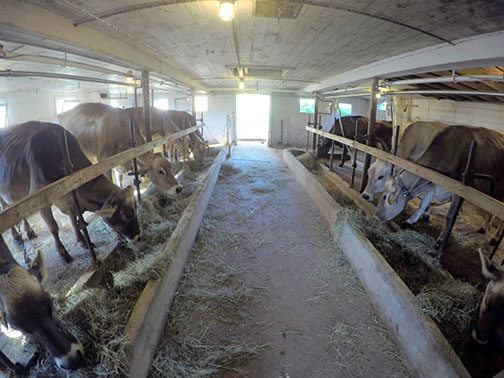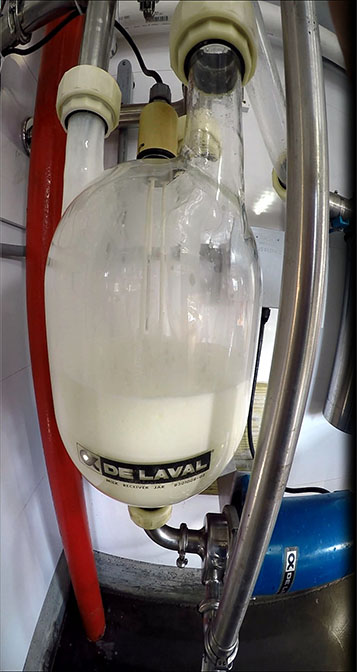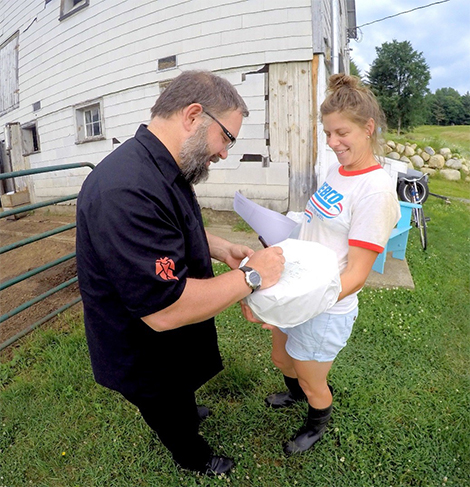
Cool Farms/Healthy Park Micro-Grant Recipient Demonstrates Sustainability Worth Every Penny
By: Emily Liebelt - Adirondack Council Clarence Petty Intern

The Sugar House Creamery's Swiss Brown cows in
the milking parlor with the new pipeline system seen
overhead. (The pipes were part of their grant project)
Tucked between the High Peaks and the Ausable River, Sugar House Creamery in Upper Jay, NY is carving its own niche in the Adirondack foodscape. They specialize in handcrafted cave-aged cheeses made from raw milk produced by their small herd of Swiss Brown cows. The farmers, Margot Brooks and Alex Eaton, operate with sustainability and community in mind. They aim to do more than make a living selling their products: their mission is to thrive despite the innumerable challenges the farmers and their animals face while sharing their knowledge and enjoyment with others.
Education takes a large portion of their time, Brooks explained to me when I visited one morning for the 6 am milking. Some people don’t know that cows only produce milk after they give birth, she noted, and they are sometimes shocked to learn what it takes for a cow to be “freshened,” meaning producing milk. By making their farming activities as transparent as possible; allowing curious people inside and providing honest answers; Brooks and Eaton hope to spread awareness about where good food really comes from and why small farms like theirs are so important.
The Adirondack Council’s Cool Farms/Healthy Park program (CFHP) was designed for the complimentary purposes of supporting environmentally friendly farming as an important 
The milk receiver jar used in
the new pipeline system.part of a sustainable Adirondack economy, protecting open space, and reducing carbon emissions. The outcomes of thiis micro-grant program funded by the Klipper Fund are carbon emissions reduction, planning to help bring or help keep the next generation of farmers on to the land and clean and environmentally healthy sustainable farming efforts. Projects that enhance the economic, human and environmental sustainability and resiliency of Adirondack farms are prioritized for grants.
Sugar House Creamery applied for, and received, an Adirondack Council/Klipper Fund micro-grant to update their milking equipment and make the twice-daily process more efficient. They have since installed new pipes and pumps in their milking facility and are already benefiting from the changes. The new apparatus uses less electricity by taking less time moving the milk from udders to holding tank. It also eliminates the need for the farmers to haul heavy buckets. Brooks mentioned that with these improvements, they have also given the cows more time out of the milking parlor and back in the pasture, sequestering carbon and living their happy-cow lives.
Energy security and climate resiliency are essential for Adirondack agriculture systems like Sugar House Creamery. Since farmers are married to the land they work on, they are often the hardest  Greg Sherman (chef at the Big Slide
Greg Sherman (chef at the Big Slide
Brewery and Public House in Lake Placid)
and Margo Brooks engage in a cheesy
transaction, spreading the goodness of
local products throughout the Adirondacks.hit by climate change and the unpredictability it brings. Adirondack farms are in an especially precarious situation because they are so networked and reliant on each other’s success. Sugar House Creamery’s farm store supports other local food producers by stocking their products: Mace Chasm Farm, North Country Creamery, Blue Pepper Farm, and The Clay Hearth. In an area where acidic soils, fluctuating severe weather and the rural economy set limits on what is easy to do, Adirondack farmers are on the front lines of fighting climate change. With the Adirondack Council Klipper Fund micro-grants, Sugar House Creamery and eleven other Adirondack farms are becoming more resilient and prepared for whatever changes may come. These farms set strong examples of responsible energy usage and ecological sustainability.
A visit to Sugar House Creamery is a welcome dose of reality, even though it can be hard not to romanticize their wholesome agricultural lifestyle. A trip to their farm store for a bit of Dutch Knuckle (my favorite of their three cheeses) is an investment in the health and security of the Adirondacks.
|
|||





